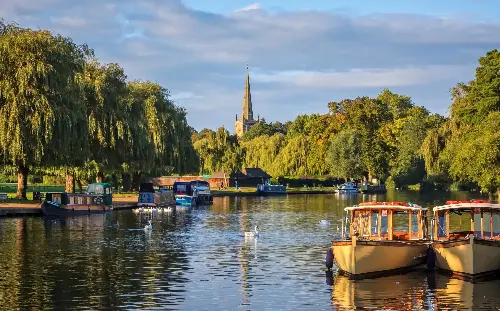
My hands are sticky with strawberry ice cream, so I wipe them on my Teenage Mutant Ninja Turtles T-shirt while someone blathers on about a bloke called William Shakespeare.
I’m in a strange town with marauding swans, a lazy river, and a stone bridge that glows in the decadence of mid-summer. Colourful narrowboats float on a listless canal while cars trundle up streets lined with crooked Tudor buildings. You can’t move for badly dressed Yanks clutching camcorders.
It’s a memory – probably an unreliable one – that visits me every so often; a happy, hallucinatory flashback of a childhood trip to Stratford-upon-Avon. Now I’m back, 30-something years later, reassured that nothing much has changed. The marauding swans are still here, the river still lazy, the Cotswold stone still glowing. The Americans are nowhere to be seen, mind. Yes, it’s audibly quieter here these days.
Well, sort of. Stratford has found itself at the centre of a row over a project to “decolonise” Shakespeare’s birthplace. As is the fashion these days, the Shakespeare Birthplace Trust, which looks after properties associated with the Bard, has tasked itself with examining the role that Shakespeare’s work – and objects in its care – have played in promoting Anglocentric and colonialist thought. The aim being to create a more inclusive museum experience.
It’s an undertaking that sparks fervent debate on the streets of Stratford this Friday afternoon.
“Anglocentric? How many of his plays are set in sodding Italy?” sighs tour guide Joe Rukin, who I meet at the top of Sheep Street for his “sinister walking tour of Shakespeare’s Stratford”. “It seems unnecessary; we should just celebrate his work.”
Something about Stratford made me lean into the cliché of olde England – its macabre myths and legends – so I signed up to Rukin’s excursion into the town’s dark heart. “The scariest thing we’ll encounter is what falls out of Wetherspoons,” he quips.
Shakespeare, he says, stating the obvious, lived long before British colonialism took off. In fact, England was disentangling itself from foreign influence as it broke away from the Roman Catholic Church during the Reformation.
“Shakespeare’s baptism [in 1564] was recorded in Latin, but his burial [in 1616] was recorded in English – and he had a lot to do with that shift,” says Rukin, cutting an imposing figure in his top hat and tails, a creased shirt poking out of a roguish leather waistcoat. “He made English fashionable again.”
Unconstrained by spelling pedantry, Shakespeare (or Shaxberd, Shappere and Shakspere, depending on his mood), introduced an estimated 1,700 words to the English language, including gossip, fashionable and rant, not to mention my wife’s name, Imogen. He was a prolific phrasemaker, too. “Vanish into thin air”, “one fell swoop” and “cold comfort” are among his many gifts.
But the Bard may not have enjoyed such an enduring legacy were it not for one man. Rukin points his skull-capped cane towards a black-and-white building, home to the Garrick pub. It’s named after the 18th-century thesp David Garrick, hailed “ye best Actor ye English Stage had produc’d” by then prime minister William Pitt the Elder.
Garrick’s most enduring legacy, however, was reviving interest in Shakespeare almost 150 years after the Bard’s death, turning his Stratford birthplace into a kind of Shakespeare Disneyland.
“He brought Shakespeare back to Stratford, and is probably the person to thank for all these tourists,” says Rukin, as sightseers walk by. “We’re not long after the Reformation at this point. Shakespeare was absolutely used to create a new English identity.”
That identity was exported to the colonies. But while Shakespeare spoke the language of the occupiers, he also gave voice to the oppressed, as local stagehand Nick Dobson, who I bump into on Sheep Street, points out.
Indeed, Shakespeare’s plays, which platform the marginalised, have been adapted by writers and directors around the world to speak of contemporary struggles. The Chinese – hardly effusive advocates of the British Empire – love the Bard so much they’re building a replica of his home town in Fuzhou.
“I studied Shakespeare – I love his love stories – and I said to my husband, ‘Take me to the Shakespeare place,’” says Mani Cupta, a tourist from Uttar Pradesh, India, who I find outside Shakespeare’s birthplace with her obliging husband, Gary. “I like it very much here. It’s beautiful, very quiet.”
Not on Rukin’s tour, it’s not. In his booming voice he rattles off some local ghost stories as we walk towards New Place, Shakespeare’s final home. Only it’s not there. Its subsequent owner, one Reverend Francis Gastrell, razed it in a fit of rage in 1759, because he was fed up with tourists coming to visit. A commemorative garden has been planted in its place.
More than 400 years after his death, Shakespeare continues to support a thriving cottage industry of scholarly speculation; a maddening morass of contradictory academia that struggles to answer some of the most basic questions about the Bard. Like how he died.
One romantic tale persists: that he popped it during a drinking binge to celebrate his birthday – a true writer’s exit. We do know that he’s buried at the Holy Trinity Church, or rather most of him is – his skull is missing, assumed stolen by grave robbers.
“A church in Worcestershire claimed to have it for a while, but it turned out to be that of a 70-year-old woman,” says Rukin, as we stand in the church grounds, birdsong and pollen in the air.
The tour winds up near Bancroft Gardens, where the Stratford Canal meets the river Avon. It’s a picture of quintessential Englishness. Families eat ice cream amid blooming chestnut trees and scavenging swans, while theatregoers trickle into the imposing Royal Shakespeare Theatre. The smell of chips wafts from Barnaby’s Fish Restaurant while a street entertainer plucks a guitar.
“Don’t worry about the swans,” says Rukin, as the birds waddle towards us. “Tamest swans in the world, these. They get fed chips their entire lives. However, the geese are buggers.”
A feeling of contentment washes over me in Bancroft Gardens. I’ve succumbed to the serenity of Stratford. And I’m not the only one.
“I could sit here for hours,” says Mark Scott, who’s watching the world go by with his Yorkshire terriers Tiffany and Suzy, while wife Mandy fetches ice cream.
Scott, an HGV driver from Bloxwich, Walsall, is here celebrating his 61st birthday. He comes often. It’s his happy place.
“There’s no care in this country anymore,” he sighs. “I see litter everywhere. It upsets me. That’s why I come here. I like going to places that make me feel good.”
So do I, so I head to the Dirty Duck (AKA the Black Swan), a pretty waterside pub claiming to be the only one in the land trading under two names. Even the boozers here have alter egos. Inside, a dalmatian sits on a stool at the “Actor’s Bar”, while a French tourist drinks wine amid photos of stars who have supped in the tavern. Dame Judi Dench, Dame Helen Mirren and John Lithgow among them.
I have a swift one before walking over to the charming Attic Theatre for an intimate production of The Tempest, a play widely interpreted as an allegory of colonialism and colonial liberation.
It ends with the famous line: “As you from crimes would pardoned be, yet your indulgence set me free”, addressed directly to the audience.
It’s a plea for redemption from the reconciliatory tyrant Prospero, and it melts away into raucous applause like ice cream on a summer’s day.
